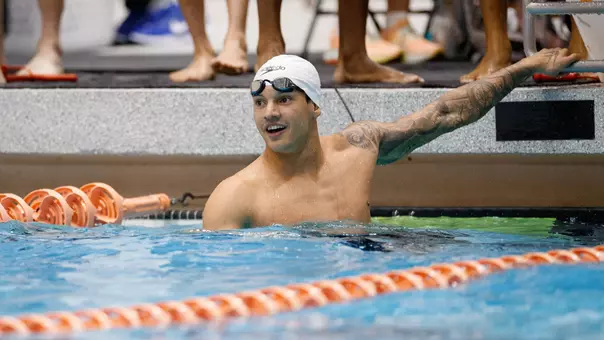University of Tennessee Athletics
Tennessee Swimming & Diving - History
October 26, 2001 | Men's Swimming & Diving
Oct. 26, 2001
|
From the Beginning
After an unremarkable period of swimming and diving competition from 1934-1959, the program was vacated from 1960 to 1967. In order to compete for the SEC All-Sports Trophy, UT took steps to bring swimming and diving back to Knoxville. To reinstitute the program, Tennessee needed a top flight facility. In 1967, the Student Aquatic Center was completed, giving the Vols one of the best facilities in the country. The Vols would also need a coach to head up the program and would soon learn first hand that heroes often come from the most unlikely places. After being picked over for the UT head track and field coaching job and the post of Aquatics Director and Swimming Coach, Ray Bussard was finally hired upon applying for the second time. To those who were observing the genesis of the program, it must have seemed strange to place the program in the hands of a man whose experience as swimming coach was limited to summer recreation programs.
Finally, the Vols needed athletes. Or, as former Athletic Director Bob Woodruff said, the first thing you have to do in swimming is get yourself some fish. Faithfully following the words of his boss, Bussard brought in the fish -- 22 freshman, including a pair of high school All-Americas. No one could have expected the success that was realized in that first season with an inexperienced coach a team full of freshman. Bussard led his squad to 9-1 dual-meet mark and a second-place finish in the Southeastern Conference in 1968. Bill Ferry and Steve Gilliam claimed conference titles in three-meter diving and the 100 backstroke, respectively. The second season brought more success for the Vols, who broke Florida's 13-year stranglehold on the SEC Championship by taking the team title after a 13-1 dual-meet record. The Vols also made their first appearance at the NCAA Championships with Jim Baer (100 breast) and David Edgar (50 freestyle) becoming the first Vol All-Americas. The Vols also won the SEC All-Sports Trophy for good measure. The third edition of UT swimming and diving program continued to make waves in the world of swimming in 1970. The Vols recorded their first dual-meet victories over Florida and Alabama on their way to a 10-0 season. David Edgar broke the American Record in the 50 freestyle with a swim of 20.5 versus Navy. Edgar went on to win the NCAA Championship in both the 50 and 100 freestyles as the Vols claimed the first of 10 straight top 10 NCAA finishes.
In 1971, the Vols continued their climb towards the top. The Vols finished sixth at the NCAA Championships with Edgar again taking the 50 and 100 freestyle national championships. Edgar's American Record in the 50 freestyle was tied by UT freshman John Trembley, but the elder Vol was able to lower the record to 20.2 at the SEC Championships. UT also scored a historic and dramatic victory over Southern Methodist. With Sports Illustrated watching, the Vols handed SMU their first home loss in 11 years. The national sports publication went on to describe the dramatic victory, proclaim Edgar the Fastest Man Afloat and detail Bussard's unique approach to coaching a swim team. The Vols enjoyed another first in the 1972 season as Edgar represented UT on the U.S. Olympic squad and brought back the school's first Olympic Gold Medal with his world record-setting victory in the 400 freestyle relay. The 1973 season was a banner year for the Vols and for junior John Trembley. Tennessee played host to both the SEC and NCAA Championships. The Vols claimed the first of seven consecutive conference titles and finished as the runner-up at the NCAA meet. Trembley set an NCAA record by winning five first-place NCAA medals during the meet and compiling a record 64 points. Trembley won the national championship in the 50 freestyle, 100 freestyle and the 100 butterfly while anchoring UT's American record setting 400 free relay and serving on the victorious 400 medley relay team. After winning the first SEC Championship in 1969, the Vols won the conference crown in again in 1972, beginning a string of seven consecutive SEC titles culminating with a national championship in 1978, the first for an SEC team. Coach Bussard retired in 1988 with a career dual-meet record of 252-20 and a winning percentage of .926. From a meager beginning, the Vols reached the pinnacle of collegiate success. Today, the Vols continue to battle for top conference and national honors on a yearly basis. In the program's stories history, Tennessee swimmers and divers have claimed 171 individual conference titles and 38 individual national crowns in addition to countless All-America honors for its swimmers. |



















